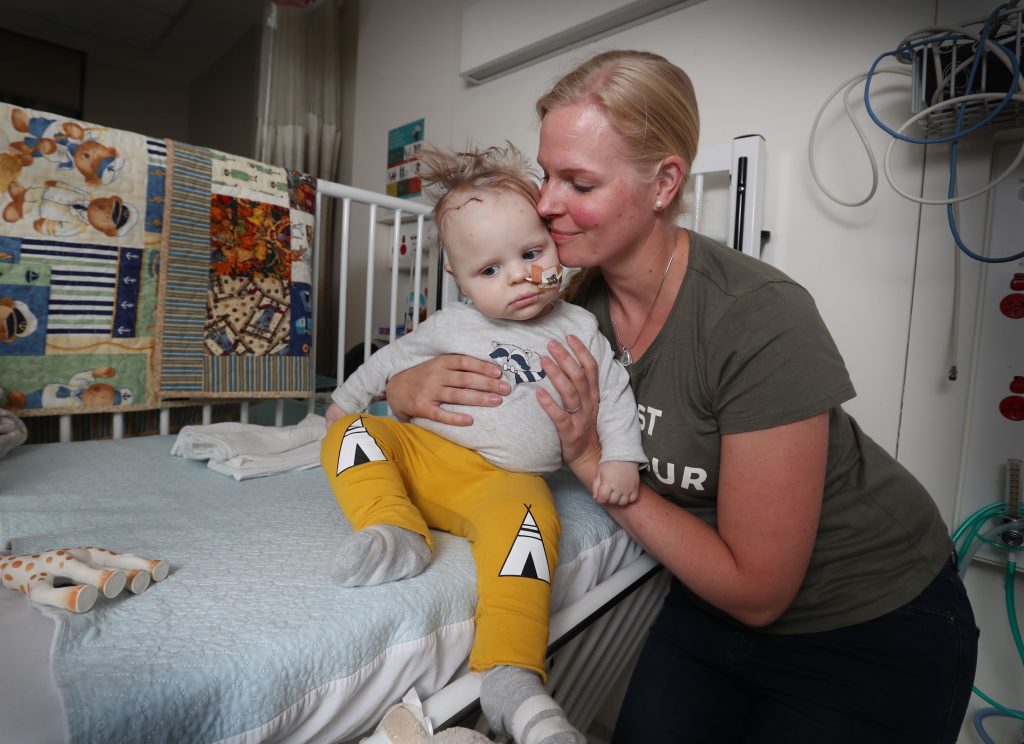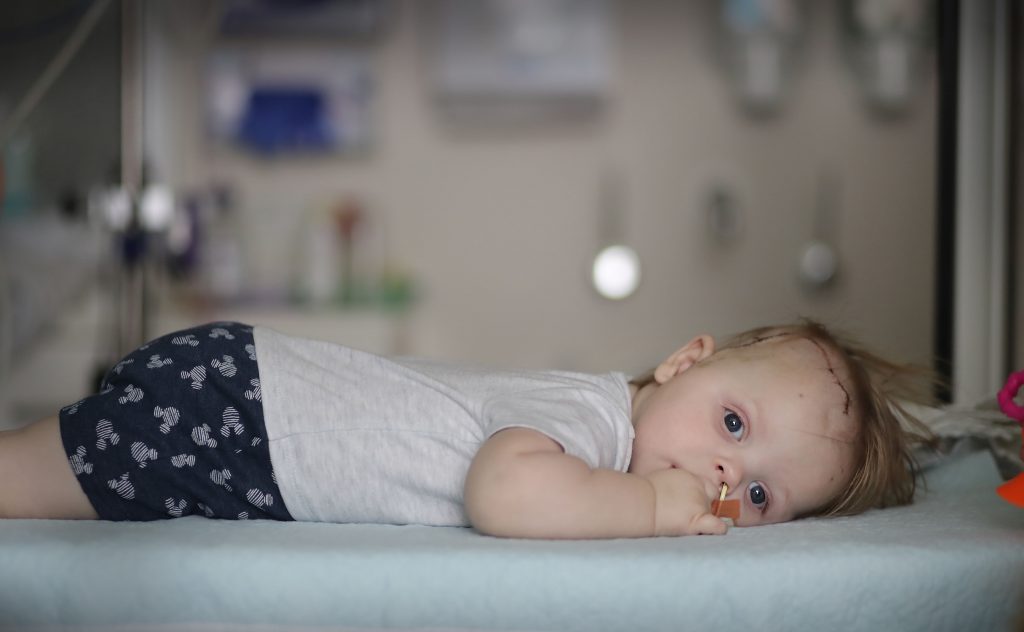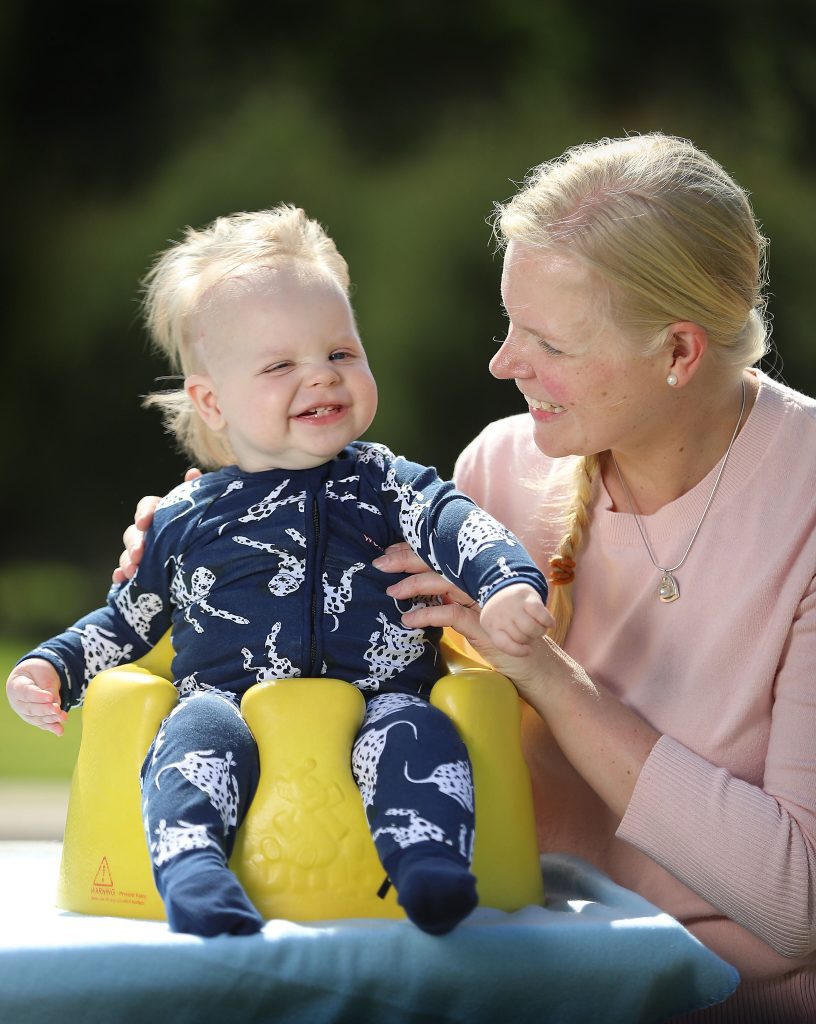Story by Alanah Frost, Herald Sun
Images by Alex Coppel, Herald Sun
As 13-month-old Henry Ryswyk snuggles into mum Maren’s arms, it’s hard to miss the scars of what the little boy has been through.
Stitches frame his face, from the top of his head to his right ear.
But it’s his big round eyes that hold your gaze — something Henry has, until now, never been able to do.
The little fighter, from Sale in East Gippsland, has just made it through the biggest battle of his short life — an operation known as a hemispherotomy to “disconnect” half of his brain.
The right hemisphere, the creative half, has been causing Henry’s tiny body to freeze in focal seizures since he was days old — sometimes up to 30 times a day. The seizures meant Henry wasn’t able to develop as expected, focus his eyes or learn words.

Young Henry Ryswyk, here with mum Maren, recovering at the Royal Children’s Hospital after brain surgery for Epilepsy. Picture: Alex Coppel.
“He had seizures daily — day and night,” Ms Ryswyk recalls. “He had his first seizure at home on day three.
“We’d had our first night at home and the next morning it started.
“We went to hospital, Sale hospital. And then we went down to Monash Hospital. They drove him down (in an ambulance) and we had to follow. That was a bit scary.”
In Melbourne, doctors diagnosed Henry with a brain malformation disorder called hemimegalencephaly.
Ms Ryswyk, husband Kase and their eldest son, Leo, 3, were devastated.
Back home, Ms Ryswyk moved into the spare bedroom with Henry to monitor his seizures during the night.
At the end of last year, the toddler managed four months without a seizure after his family independently trialled CBD — or cannabis — oil.
“He started to develop and started to show his little character coming through,” Ms Ryswyk said.
But the break was short lived and the shakes reappeared on Henry’s first birthday.

Young Henry Ryswyk, recovering at the Royal Children’s Hospital after brain surgery for Epilepsy. Picture: Alex Coppel.
After months of medications, hospital visits, emergency departments and home care, doctors referred Henry to The Royal Children’s Hospital (RCH), where it was decided it was time to operate.
A hemispherotomy is where neurosurgeons “disconnect” one half of the brain but leave it inside the head.
It’s a highly delicate operation and fewer than six are performed at the RCH a year.
A team of surgeons, nurses and anaesthetists wheeled Henry in for the marathon operation on February 29.
“They got a whole team together just to do it on a Saturday,” Ms Ryswyk said. “We sent him off at 11am … they started operating at 2pm, and they operated until 11pm.”
After a nine-hour wait, head neurosurgeon Dr Alison Wray delivered the news: everything had gone to plan.
“Since then he’s just made progress,” Ms Ryswyk said. “Now he has eye contact, which he’s never ever had before. He follows objects, toys.
“He follows us. He eats by himself, he takes a spoon to his mouth. He could never do those things before.”
Henry’s neurologist, who consulted with the family before surgery, said the operation had been life changing.

Mum Maren and little Henry can’t stop smiling. Picture: Alex Coppel
“The operation is a cure,” Dr Simon Harvey said. “What our surgeons do is disconnect (one hemisphere) — so they leave it there but cut all the connections.
“Not only did we stop his seizures we stopped any electrical activity going into the other side of his brain.
“He’s cured. He won’t be going in and out of hospital like he was before.”
The operation left Henry paralysed on his left side, meaning he will have to undergo rehabilitation to regain any control and learn how to use his left side of body. But physiotherapist Tanya Harle said by having the operation at such a young age, he has been given the “best opportunity”.
“It is quite a significant road for a kid like Henry,” she said,
“But he’s made significant gains since he’s been with us.”
Ms Ryswyk said the youngster now does it all with a smile. “He’s doing all the right things,” she said.